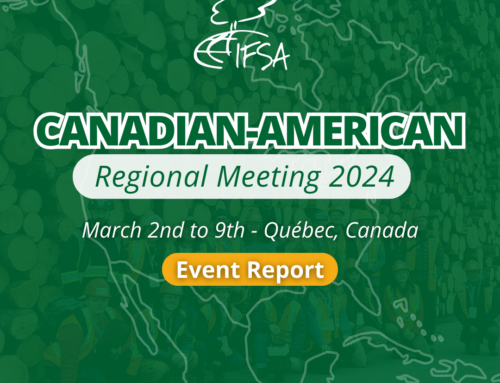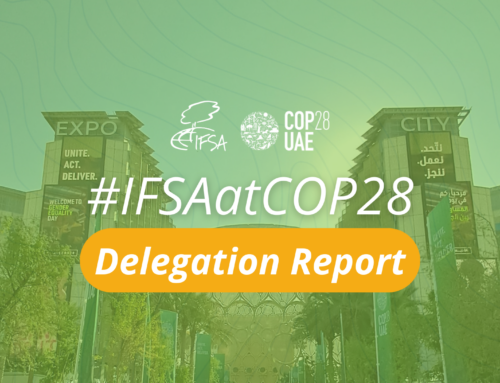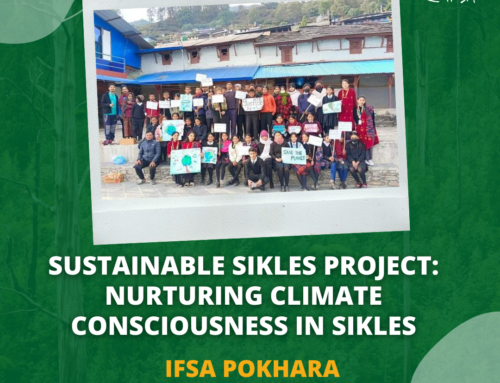 Pic: Kiara Worth (Earth Negotiations Bulletin)
Pic: Kiara Worth (Earth Negotiations Bulletin)
In early September, I had the chance to attend the 48th Mid-intersessional Meeting of Subsidiary Bodies of United Nations Framework Convention on Climate Change (UNFCCC SB 48.2) in Bangkok, Thailand. As a first-timer at a UN meeting, I tried to learn and read about the UNFCCC processes as much as I could before my departure. The IFSA delegates also joined the preparatory session hosted by YOUNGO, the Youth and Children Constituency of UNFCCC which was held a day before the opening of SB 48.2. From these sessions, we learned a lot about the basics of UNFCCC (history, processes, and updates of current situation) and YOUNGO roles as an observer throughout the meeting.
I was overwhelmed by the atmosphere as soon as I arrived at the United Nations Conference Centre. There were tons of different press conferences and meetings happening every single day, but as an observer I could only attend a few of them because it’s mostly open to country delegates only. During the 6 days of climate talks and negotiations, country delegates and observers were busy catching up with discussions on several agenda items of the Subsidiary Body of Implementation (SBI), Subsidiary Body of Scientific and Technological Advice (SBSTA), as well as the Ad Hoc Working Group on the Paris Agreement (APA) to make sure that the basis for the Paris Agreement Work Programme (PAWP) could be finalised at the end of the week.
 Pic: private documentation
Pic: private documentation
Among all the different agenda items, I chose the SBI agenda item number 5 regarding the common timeframes for the implementation of Nationally Determined Contributions (NDCs) as my main focus. NDCs is my favourite topic because in my country’s NDCs (Indonesia), forestry sector plays a huge role as the governments are set to cut the GHG emissions from this sector up to 17.2% out of 29% (total target) by 2030.
The SBI discussions on agenda item 5 were co-facilitated by Marianne Karlsen (Norway) and George Wamukoya (Kenya). This discussion was focused on the common timeframes for parties to renew or update their NDCs. Currently, those parties with a 5-year NDC are requested to communicate a new NDC by 2020 and those parties with a 10-year NDC are requested to communicate or update their NDC by 2020 (Earth Negotiation Bulletin 2018). A group delivered their opinion saying that developed countries should apply common timeframes, but developing countries should have more flexibility because they need more time and bigger efforts to prepare the implementations of their NDCs. Several developed and developing countries objected to this option, because a single common timeframe must be applied to all countries in order to form an effective review of the impact of NDCs every 5 years, known as the global stocktake. The real implementation of NDCs will start on 1st January 2013, but countries are more than welcome to start earlier (on a voluntary basis).
 Pic: private documentation
Pic: private documentation
Another session that I also attended was the Asian People Movement on Debt and Development (APMDD) press conference titled “ Transforming Energy Systems for People and Communities”. The speakers were representing countries in Asia region such as Indonesia, Philippines, Bahrain, India and Japan. They talked about fossil fuel energy in their country region; as we all know, energy is very crucial to the implementation of Paris Agreement. The APMDD demands that governments stop using fossil fuel and shift to clean & renewable energy. The Philippines is threatened by coal power plants, and Indonesia will soon build a 15000 megawatt coal power plant. In Japan, coal projects are still getting financial support from the government. One of my favourite quotes from this forum was delivered by Lucy Cadena, the Climate Justice and Energy Coordinator of Friends of the Earth International: “Even if climate change is not happening, we still have to shift from fossil fuels in the future.”
Even though forestry topics didn’t really get a spotlight in this Bangkok Session, the overall experience from this meeting were truly awesome. Being an observer and working together with YOUNGO in this meeting provided me with a wide scope of new perspectives about the global efforts to save our Mother Earth through the soon-to-be-implemented Paris Agreement. Hopefully for the upcoming COP24, we can find ourselves ready for 2020 with the Paris Agreement Work Programme in our hands.
About the writer : Arifah Hidayati is currently a third year undergraduate student in the Faculty of Forestry, Universitas Gadjah Mada, Indonesia. She is also a member of IFSA LC UGM and can be contacted through arifah.hdyt64@gmail.com.]]>



